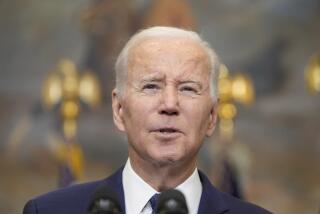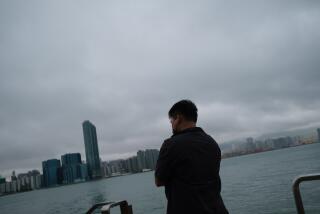High U.S. Profile Would Only Compound the Dilemma : Hong Kong: A ‘safety net’ of visas won’t cover those who will stay behind. Preserving a strong economy will help.
- Share via
The local geomancers insisted that a small willow be planted in the grassy lawn behind the governor’s residence in downtown Hong Kong last year to protect it from the knife-edge of the new Bank of China building rising a thousand feet high just down the hill, slashing like a sword at the residence’s center. The willow is growing well but its magic has faltered.
A year ago, it seemed promising that reforms in China and a spirited give-and-take between Beijing and the Hong Kong Chinese might produce agreement on the “basic law” to guide an autonomous Hong Kong after 1997. By early 1989, the Chinese had improved sections on human rights and judicial review. Further revisions seemed attainable.
Then came June in Tian An Men Square.
For most of the people in Hong Kong, this event convinced them that for the foreseeable future, Beijing is not likely to accept any behavior that it perceives as damaging to China’s vital interests. Those who believe that Hong Kong can still survive and grow--even under the present harsh Chinese leadership--say it can be pulled off only if the territory isolates itself from political movements on the mainland. Many in Hong Kong are not willing to pay that price.
Young professional and business elites with an eye to the future are leaving--55,000 to 60,000 this year, up nearly 50% from 1988. This outflow cannot rise much more, however, and could shrink if employment demand in Australia and Canada (destinations for 60% of emigrants) declines. There are 3.2 million Hong Kong citizens with some claim on British nationality. Political opposition at home has kept Britain from issuing passports that would give this group the eventual right to reside in England, thus providing the real reassurance that they need not flee Hong Kong quickly. International pressure may force Downing Street to back down, but probably not for more than 50,000 to 100,000 passports.
What should America do? Congressional proposals merely ask the President to convey to Beijing our government’s concern about democracy and the colony’s future. Some members want to go much further, linking future Sino-U.S. relations explicitly to Beijing’s respect for human rights and democracy in Hong Kong. The Administration will not easily be persuaded to handcuff its China policy irrevocably to Hong Kong. There is also bipartisan support for calling an international conference to “express concern” about Hong Kong, exert pressure on Beijing and offer strong assurances to local citizens of a “safety net”--promises of British passports or visas from America, Canada, Australia and other countries.
The reality is that the more the United States and others actively encourage emigration, the more we risk eroding the Hong Kong economy and long-term prospects for the territory. No “safety net” is likely to cover much more than a million of the nearly 6 million Hong Kong Chinese. The strongest protection for those who do not or cannot leave will be a strong and vital Hong Kong economy.
Hong Kong citizens are divided over whether intensified international focus will help or hurt the colony. There is a big risk of forcing the Chinese hand, intensifying the confrontation. But others argue that Beijing must be warned of paying a stiff cost internationally if it leans too heavily on the territory. Those who are single-mindedly committed to a change in the character of the regime go further and welcome any pressures that focus opprobrium on China, regardless of the impact on Hong Kong itself.
Perhaps at some point in the 1990s a stronger American posture on Hong Kong may be needed. American officials must continue to make private expressions of concern to the Chinese. So must the major international banks and other corporations doing business in Hong Kong.
But at this time, a high profile on the part of Washington is more likely to weaken confidence, increase business uncertainty and accelerate emigration. By arousing unrealistic expectations of U.S. policy toward future Hong Kong “refu-gees,” Washington would be further aggravating Sino-U.S. relations. And all this in turn would damage the delicate position of officials in those Chinese coastal provinces who are most committed to long-term reform in China itself and to working cooperatively with Hong Kong.
Not every problem has or needs an American solution. Hong Kong is one of these.
More to Read
Sign up for Essential California
The most important California stories and recommendations in your inbox every morning.
You may occasionally receive promotional content from the Los Angeles Times.













